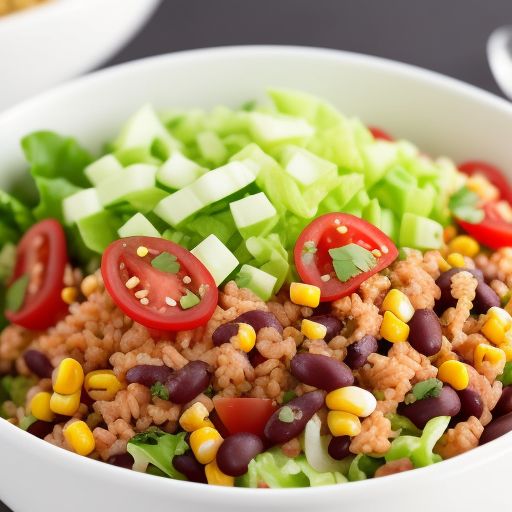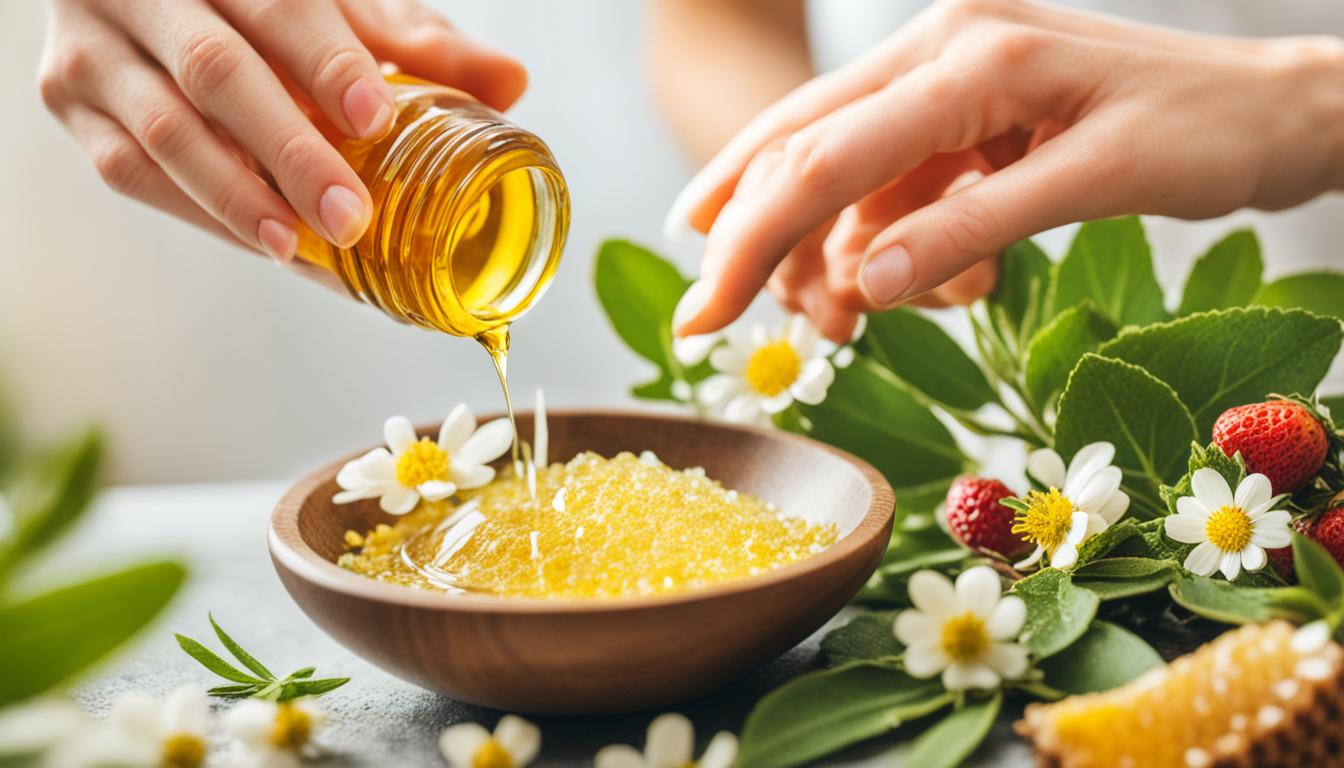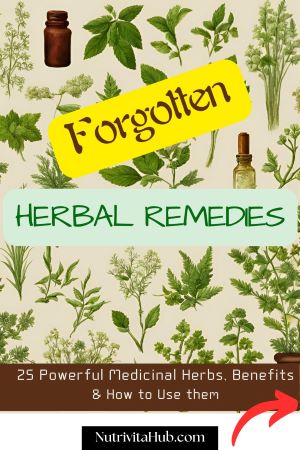Fight Acne With These Powerful Natural Remedies.
Are you tired of dealing with pesky acne and blemishes? 😩✨
You’re not alone! Many people struggle with skin issues, but the good news is that there are natural remedies that can help. In this blog post, we’ll explore the Top 5 Natural Remedies to Combat Acne and Blemishes. 🌿💧
These easy-to-make solutions use ingredients you might already have at home, making them both cost-effective and gentle on your skin. Say goodbye to harsh chemicals and hello to a more natural approach! Let’s dive in and discover how you can achieve clearer, healthier skin. 🌟
Acne is a common skin issue that hits about 85 percent of young folks in the U.S. Many people look for natural ways to fight acne and blemishes because some medicines have side effects.
This piece looks at the top 5 natural fixes that might help, like tea tree oil, apple cider vinegar, aloe vera, honey and cinnamon, and green tea. It also talks about how to avoid acne and when to get help for serious acne.
Key Takeaways
- Acne is a common skin condition affecting a majority of young adults in the United States.
- Natural remedies, such as tea tree oil, apple cider vinegar, aloe vera, honey and cinnamon, and green tea, can be effective in combating acne and blemishes.
- Lifestyle changes, including avoiding pore-clogging products and managing stress, can also help prevent acne flare-ups.
- Seeking professional help may be necessary for severe or persistent acne cases.
- The article provides a comprehensive guide to natural acne remedies and prevention strategies.
Understanding Acne and Its Causes
Acne is a common skin issue. It happens when oil and dead skin cells block the skin’s glands. This can cause whiteheads, blackheads, and pimples. Knowing what causes acne helps find natural ways to deal with it.
What is Acne?
Acne shows up as pimples, blackheads, and other marks on the skin. It comes from hormonal changes, too much oil, clogged pores, and certain bacteria.
Factors Contributing to Acne Development
Many things can make acne worse, including:
- Hormones: Hormonal changes, like during puberty or pregnancy, can make more oil and clog pores.
- Bacteria: Some bacteria can cause inflammation and pimples.
- Genetics: If your family has acne, you might get it too.
- Certain medications: Some drugs, like corticosteroids and lithium, can make acne worse.
- Clogged pores: Too much oil, dead skin, and dirt can block pores and cause acne.
- Lifestyle factors: Stress, diet, and some skincare products can also lead to acne.
Knowing what causes acne helps us manage it better. We can then look for natural ways to fight it.
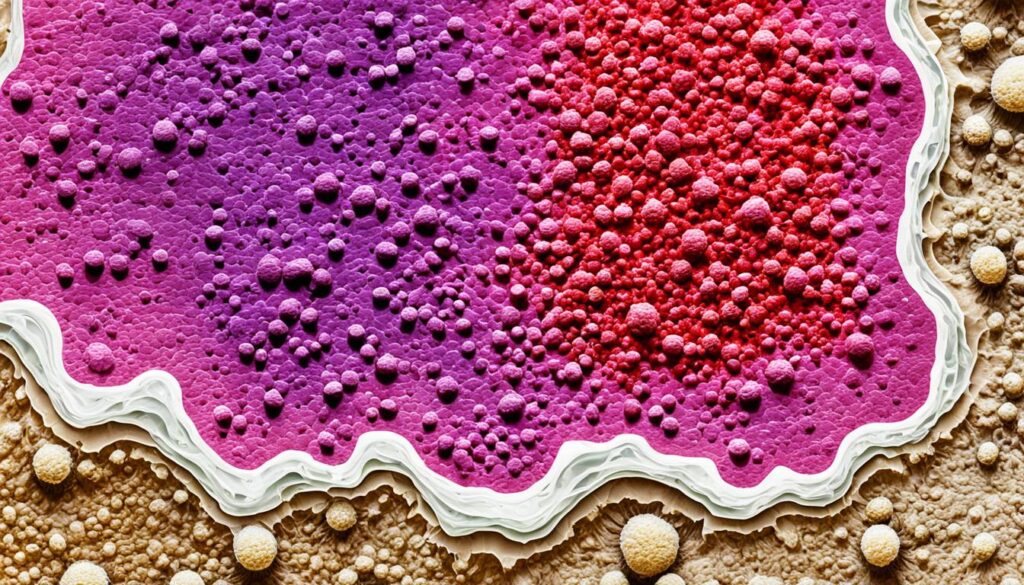
Tea Tree Oil: A Natural Antibacterial Solution
Tea tree oil is a strong natural fighter against acne and blemishes. It comes from the Melaleuca alternifolia tree. It’s known for its tea tree oil antibacterial and tea tree oil anti-inflammatory powers.
Benefits of Tea Tree Oil for Acne
Tea tree oil fights acne at its root. Studies show it can lower acne-causing bacteria on the skin. It stops Propionibacterium acnes, the main acne bacteria, from growing.
This helps prevent new blemishes and heals existing ones. It also reduces redness, swelling, and irritation from acne.
How to Use Tea Tree Oil for Acne Treatment
To use tea tree oil for acne, mix it with a carrier oil like coconut or jojoba oil. This makes sure the skin doesn’t get too dry or irritated. Put the mix on your skin 1 to 2 times a day, gently rubbing it in.
“Tea tree oil has been shown to be just as effective as benzoyl peroxide, a common acne medication, in reducing the number of acne lesions.”
Adding tea tree oil to your skincare can help fight tea tree oil for acne. It makes skin clearer and healthier. Its tea tree oil antibacterial and tea tree oil anti-inflammatory qualities make it great for acne.
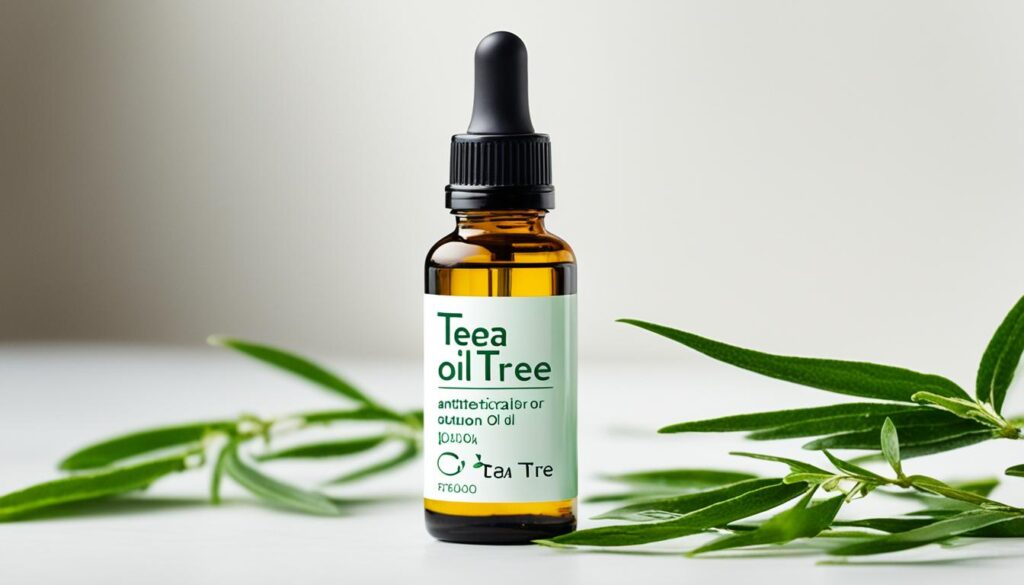
Apple Cider Vinegar: Balancing Skin’s pH
If you have acne, apple cider vinegar might help. It’s not proven by science, but many people say it works. They use apple cider vinegar on their skin to fight acne.
Apple cider vinegar has citric acid. This acid can kill the bacteria that cause acne. It also has lactic acid, which can make acne scars look better. Using apple cider vinegar can balance your skin’s pH. This makes it hard for acne bacteria to grow.
“Apple cider vinegar has been used for centuries as a natural remedy for a variety of skin conditions, including acne. While more research is needed, the anecdotal evidence suggests it may be a valuable addition to your skincare routine.”
To use apple cider vinegar for acne, mix it with water (1:1 ratio). Put it on your skin with a cotton pad. Leave it on for 5-10 minutes, then rinse. Do this 1-2 times a day. But don’t use too much, as it can dry out your skin.
| Benefits of Apple Cider Vinegar for Acne | Potential Drawbacks |
|---|---|
|
|
Using apple cider vinegar can be good for acne, but talk to a dermatologist if it doesn’t work. They can give you advice and help you find the right treatment for your skin.
Aloe Vera: Soothing Inflammation and Promoting Healing
Aloe vera is a great natural remedy for acne. It’s known for soothing and fighting inflammation. It also helps heal and lessen blemishes.
Benefits of Aloe Vera for Acne
Aloe vera has lots of aloe vera for acne and anti-inflammatory stuff. It calms irritated skin and lessens redness from acne. Studies show it can cut down on bumps, lesions, and dry skin in acne-prone skin.
How to Use Aloe Vera for Acne Treatment
- Put the gel from the aloe vera plant’s leaves on the skin once or twice a day.
- For a stronger effect, mix aloe vera gel with a carrier oil like jojoba or rosehip seed oil. Then, massage it into your skin.
- Use aloe vera as a natural moisturizer or add it to homemade face masks and serums.
Using aloe vera for acne healing helps soothe inflammation and promote healing. Add aloe vera to your daily skincare routine for clearer, healthier skin.
“Aloe vera is a natural wonder that can work wonders for your skin, especially when dealing with acne.”
Top 5 Natural Remedies to Combat Acne and Blemishes
Many people are now using natural remedies to fight acne and blemishes. They find solutions like tea tree oil and green tea very helpful. These remedies work to fix the root causes of acne and make skin look younger and healthier.
- Tea Tree Oil: Tea tree oil is great because it kills bacteria that cause acne. It also reduces swelling and heals skin.
- Apple Cider Vinegar: Apple cider vinegar balances the skin’s pH. This is key for a healthy look. It stops acne from happening.
- Aloe Vera: Aloe vera is known for healing and soothing skin. It reduces redness and swelling from acne. It also keeps skin from getting more irritated.
- Honey and Cinnamon: Honey and cinnamon fight off bacteria and reduce swelling. Putting a mask made of these on your face can really help.
- Green Tea: Green tea is full of antioxidants that fight acne. It also reduces blemishes and makes skin clearer.
Using these top 5 natural remedies can help you fight acne and blemishes. This way, you can get the clear, glowing skin you want.
“Embracing natural solutions can be a transformative step in your journey to healthier, more radiant skin.”
Honey and Cinnamon: A Powerful Antimicrobial Duo
For fighting acne, honey and cinnamon are top choices. They are great at killing bacteria that cause acne. Many studies prove they work well together.
Benefits of Honey and Cinnamon for Acne
Honey is great for acne because it fights bacteria and reduces swelling. It has special enzymes that slow down acne bacteria. Honey also soothes and heals the skin.
Cinnamon is known for reducing acne redness and swelling. It also stops bacteria that cause acne from growing. This makes it a perfect match with honey.
How to Make a Honey and Cinnamon Face Mask
Creating a honey and cinnamon mask is easy. Here’s what to do:
- Mix 2 tablespoons of raw honey with 1 teaspoon of cinnamon in a bowl.
- Stir until it’s smooth and creamy.
- Wash your face and put the mask on the acne areas.
- Leave it on for 10-15 minutes, then rinse with warm water.
- Do this 2-3 times a week for clear skin.
Using this mix in your skincare routine helps fight acne. It leads to clearer, healthier skin.
Green Tea: Harnessing the Power of Antioxidants
Green tea is a great natural way to fight acne. It’s full of polyphenol antioxidants. These help tackle the root causes of acne.
Green tea antioxidants can lower the amount of oil your skin makes. This is important because too much oil can lead to acne. They also fight the P. acnes bacteria that causes acne. Plus, green tea polyphenols can reduce swelling and redness from acne.
Drinking green tea might not directly help with acne, but studies show it works well when used on the skin. Using products with green tea can cut down on oil and pimples in people with acne.
“Green tea’s antioxidant-rich composition makes it a natural ally in the fight against acne.”
To use green tea for acne, add it to your skincare routine. Look for cleansers, toners, or spot treatments with green tea. Using them as directed can help prevent and manage acne.
| Benefit | Mechanism of Action |
|---|---|
| Reduced Sebum Production | Green tea antioxidants can help regulate sebum secretion, minimizing clogged pores. |
| Antimicrobial Properties | Green tea polyphenols possess the ability to inhibit the growth of P. acnes bacteria. |
| Anti-Inflammatory Effects | The antioxidants in green tea can help reduce inflammation and redness associated with acne. |
Lifestyle Changes to Prevent Acne Flare-Ups
Making some lifestyle changes can help prevent and manage acne. Avoiding products that clog pores, staying hydrated, and managing stress are key. These changes can greatly improve your skin’s health and look.
Avoiding Pore-Clogging Products
Choosing the right skin care products is important for fighting acne. Use oil-free and non-comedogenic products that won’t clog your pores. Avoid heavy, greasy items and pick lightweight, water-based ones instead.
Staying Hydrated and Managing Stress
Drinking enough water and managing stress are vital for your skin. Dehydration and stress can make acne worse. Drink lots of water and try stress-reducing activities like meditation, exercise, or hobbies.
Using natural remedies and making these lifestyle changes can help prevent acne. This way, your skin will look and feel great.
“Proper hydration and stress management are key lifestyle factors that can influence the development and severity of acne.”
When to Seek Professional Help
Natural remedies can help with mild to moderate acne. But sometimes, you need a doctor’s help. This is true for severe, chronic, deep, or painful acne sores. Or if home remedies don’t work.
A dermatologist can give you stronger prescription medications. These can be things like topical retinoids, antibiotics, or hormonal treatments. These acne medications can really help with stubborn or cystic acne.
They can get to the root of the problem. This way, you can get clear, healthy skin.
- Seek professional help for severe, chronic, or treatment-resistant acne
- Dermatologists can prescribe stronger acne medications to manage stubborn cases
- Prescription treatments may include topical retinoids, antibiotics, or hormonal therapies
“When home remedies aren’t enough, it’s important to see a dermatologist for personalized acne treatment.”
Natural remedies are a good start, but sometimes you need more. A dermatologist can help make a plan to manage your acne. This can also help stop future breakouts.
Conclusion
In conclusion, we looked at the top 5 natural remedies for acne. These include tea tree oil, apple cider vinegar, aloe vera, honey and cinnamon, and green tea. They are great for fighting acne using things you might already have at home.
While we need more studies on how well these work over time, using them with other healthy habits and doctor’s advice can help. This can lead to clearer, healthier skin for many people.
These natural remedies use nature’s own powers to fight acne. They are easy on the wallet and offer a good alternative to harsh acne treatments. Using them alone or with other treatments can make your skin look better.
It’s key to watch how your skin reacts and change your routine if needed. Trying out these natural remedies can be a good step towards better skin. It can help you fight acne and improve your skin’s health.
FAQ
What are the top 5 natural remedies for combating acne and blemishes?
How can tea tree oil be used to treat acne?
What are the potential benefits of using apple cider vinegar for acne?
How can aloe vera be used to treat acne?
What are the benefits of using a honey and cinnamon face mask for acne?
How can green tea help with acne?
When should someone seek professional help for their acne?
Source Links
- 5 Natural Ingredients That May Help Calm Acne – Dermatology Center of Northwest Houston – https://www.dermatologynwhouston.com/5-natural-ingredients-that-may-help-calm-acne/
- 16 Effective and Safe Home Remedies for Acne – https://www.medicalnewstoday.com/articles/322455
- Fight Acne with These Simple At-Home Remedies – https://www.healthline.com/nutrition/13-acne-remedies

